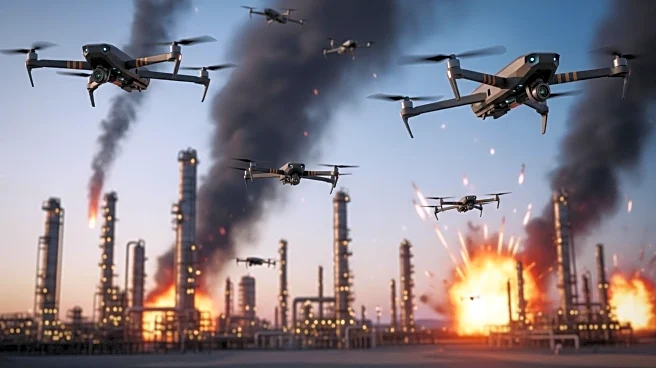What's Happening?
Ukraine has launched a series of drone attacks targeting Russian oil refineries, resulting in the disruption of 20% of Russia's oil refining capacity in August. This has led to significant fuel shortages and record-high gasoline prices across Russia, coinciding with peak seasonal demand due to summer travel and the upcoming harvest season. Ukrainian officials, including President Volodymyr Zelensky's chief of staff Andriy Yermak, have highlighted the irony of Russia facing fuel shortages after previously attempting to deprive Ukraine of fuel. The strikes are part of a broader strategy to impact Russia's war economy and hinder its ability to finance the invasion of Ukraine.
Why It's Important?
The Ukrainian drone strikes on Russian oil infrastructure represent a strategic move to weaken Russia's economic capacity to sustain its military operations. By targeting key elements of Russia's energy sector, Ukraine aims to disrupt the financial resources that support the ongoing conflict. This development could have significant implications for global energy markets, potentially affecting oil prices and supply chains. Additionally, the strikes underscore Ukraine's growing military capabilities and its determination to leverage these capabilities in its defense strategy. The situation may also influence international diplomatic efforts and sanctions policies regarding Russia.
What's Next?
Ukraine's continued targeting of Russian energy infrastructure could lead to further economic strain on Russia, potentially forcing the Kremlin to reconsider its military strategy. The development of Ukraine's long-range missile capabilities, including the new Flamingo cruise missile, suggests that future attacks could be even more impactful. As Ukraine enhances its military technology, the potential for increased pressure on Russia's energy sector and military logistics grows. International stakeholders may need to reassess their positions and strategies in response to these developments, potentially leading to shifts in diplomatic and economic policies.
Beyond the Headlines
The Ukrainian strikes on Russian refineries highlight the evolving nature of modern warfare, where economic targets are increasingly used to achieve military objectives. This approach raises ethical and legal questions about the use of economic warfare and its impact on civilian populations. The long-term implications for Russia's energy sector could be profound, potentially leading to shifts in global energy dynamics and influencing geopolitical alliances. The situation also underscores the importance of technological innovation in military strategy, as Ukraine's development of advanced missile systems could alter the balance of power in the region.









